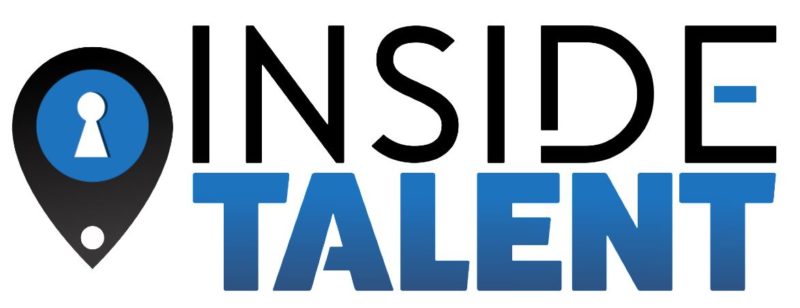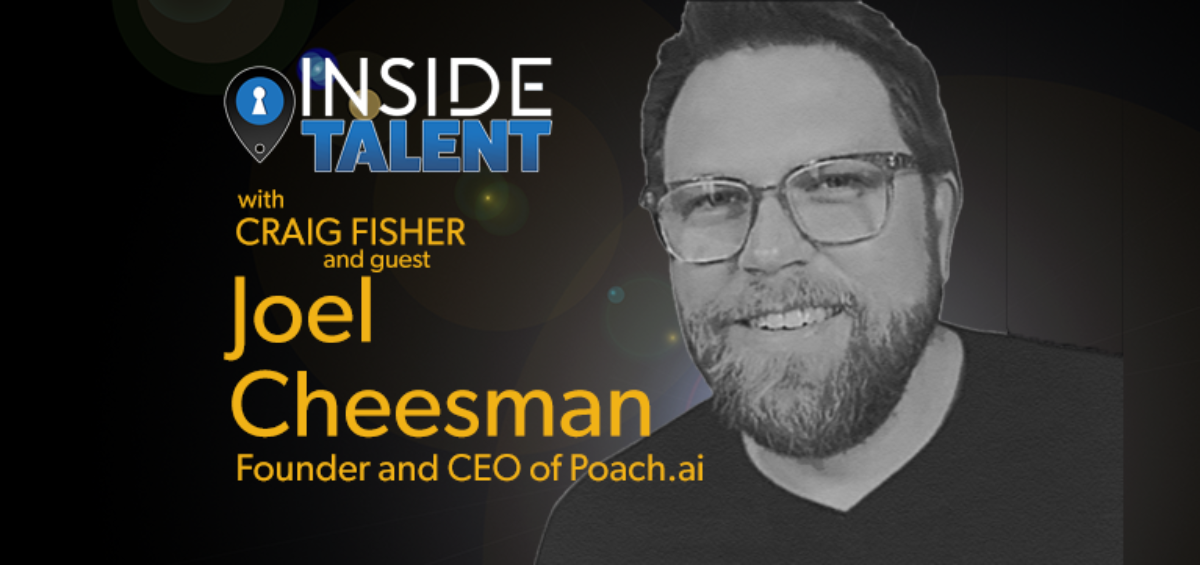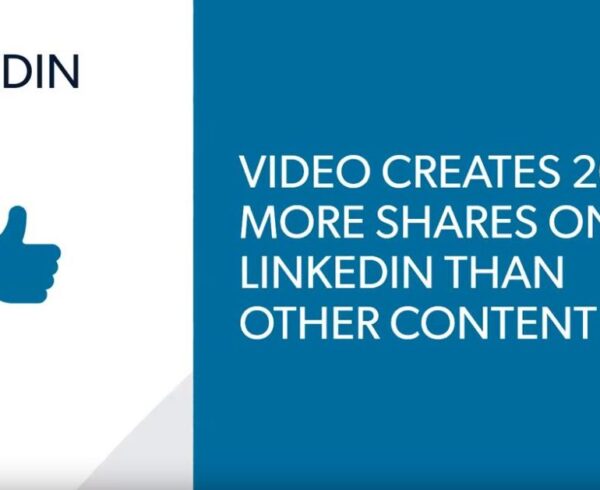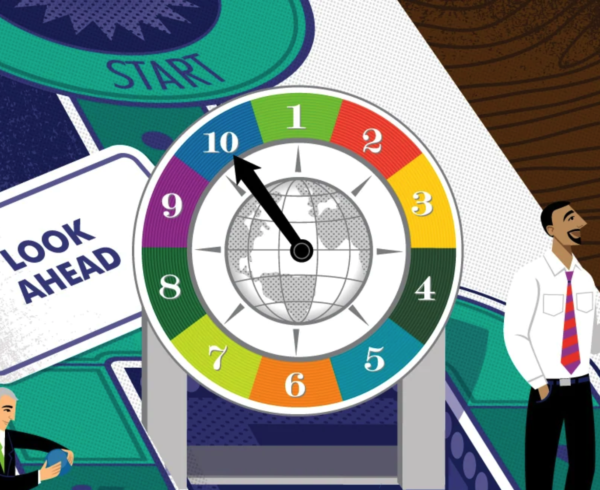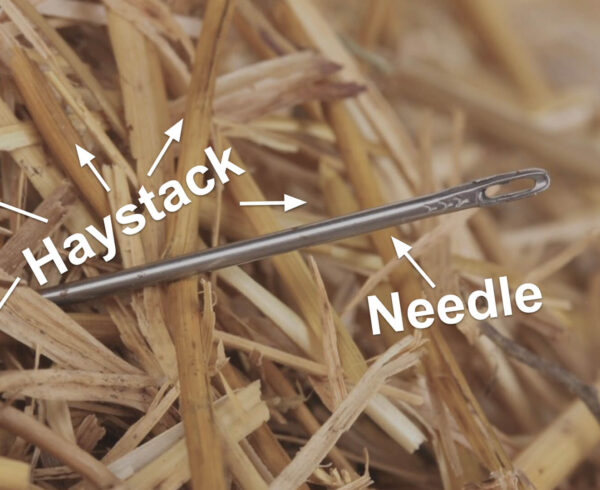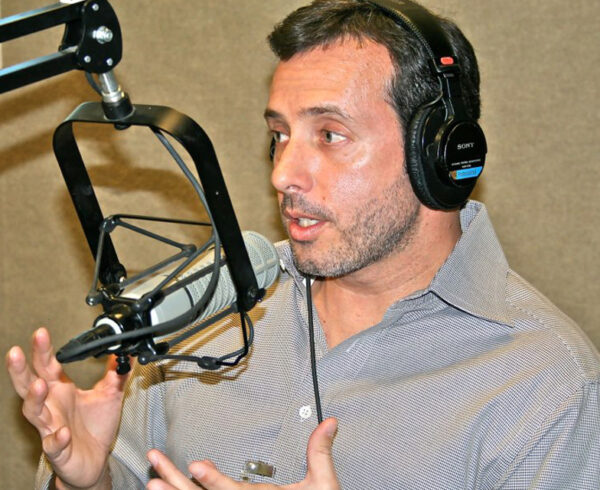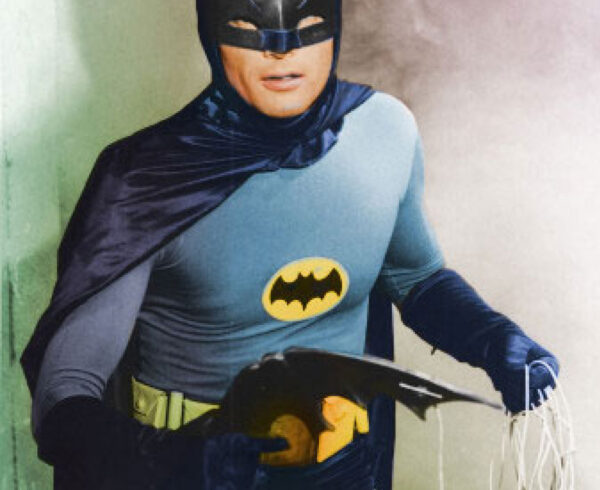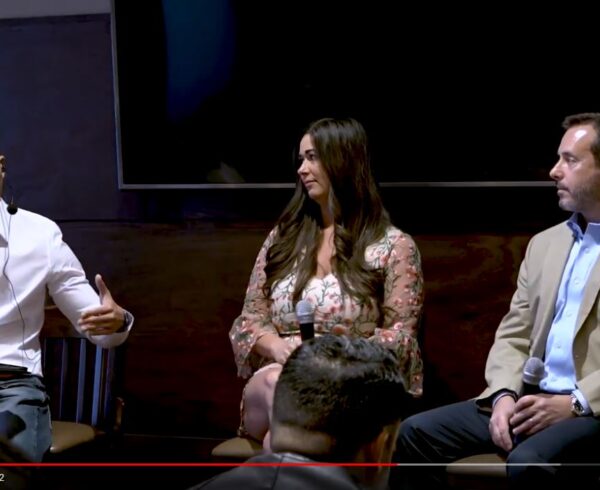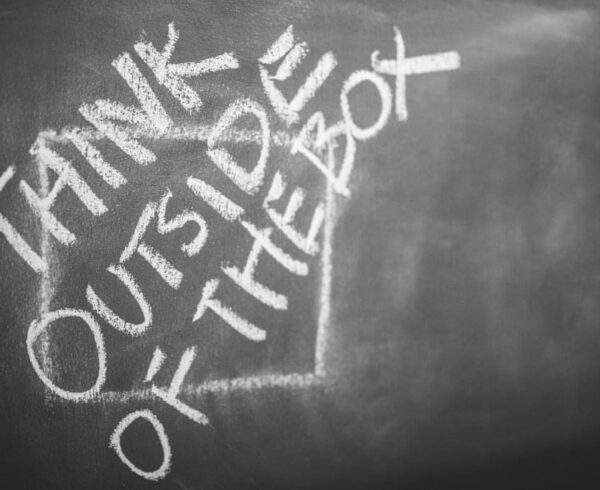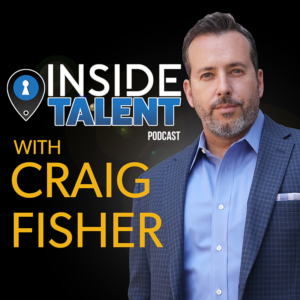Joel Cheesman and I go way back. He spoke at some of the very first TalentNet Live conferences and was a friend and fellow blogger back in the early days of RecruitingBlogs.com. In this episode of Inside Talent we discuss Joel’s new venture, Poach.ai that performs daily sentiment analysis for your company, or of any competitors you, as an employer, might target for talent acquisition purposes.
We also discuss Joel’s swag marketing strategy
How to save time recruiting from competitors when the iron is not and how to know when it’s not
The current talent shortage that includes companies like Uber and Lyft
Stimulus checks, IRS refunds
The current high cost of Indeed
Smart job title strategy
The return of in-person events
Clubhouse
And much more.
Full text:
Joel Cheesman with Craig Fisher on Inside Talent
SUMMARY KEYWORDS
people, podcast, companies, events, clubhouse, poach, talent, linkedin, talk, conference, job, sponsor, rackspace, recruiting, months, dice, twitter, money, virtual, business
00:08
It’s Craig Fisher. I’m with Joe Cheeseman.
00:11
He is the
00:11
founder and CEO of a one person company of poach Sure. That’s
00:17
the only reason to start a company. Yo, bitch.
00:20
That’s right.
00:23
And we’re talking today about all kinds of stuff. We’re going to talk a little bit about poach. We’re going to talk about podcasting. We’re going to talk about the return of in person events. We might talk about the record setting money that’s been coming in to find startups in this in this industry, which is crazy. We should mention massage when we do that since their sponsor this podcast.
00:48
Yeah, pronounced visage and got abuse for that. I’m sure because they’re French. They wouldn’t allow that. That’s not German. What am I gonna do? i? Is Vice naef title, no
00:59
vicious.
01:01
So what service did you use? And I know you reached out directly and asked me for my address. Yeah. So how many people did you have to do that? With? Did you automate it? And what service did you use to send out the swag?
01:17
Yeah, that was that was old school shit. I mean, I didn’t have 1000s of people. So this was, you know, we have a few. We have about 300 or so users. Now on poach at the time that I started, I had, you know, 100 150. And I just emailed and said, Hey, if you guys if you want free shit from me, give me your fill in your address, and we’ll send you stuff. Yeah. And the goal of it was really, like I, I feel like most companies will just send you stuff and not want anything in return. And they hope that you’ll put it on social media, or you’ll talk about it, or have it on your desk or whatever. I tried. The strategy I tried was like, I’m gonna send you like a little thing. I think in this case, it was a magnet. Yeah. And I said, and if you if you show this somewhere, take a picture put on social media, tag poach, we’ll send you something better. So we sent out a let’s call it 25. magnets to people, let’s call it 10 people to 15 put it on their fridge, put it on there. But like I mean, people had fun with it. Of course. Yeah. It is still me. And if they did that, then a few months later, I emailed I don’t know if you got this or not. But so I mailed out a Yeti coffee mug. Yeah. to people. Yeah. So the idea is, give them a little bit of a cheap thing. And then I’ll ask them to share it. And if they do, in return, we’ll send you something nicer. Right. And I like, I think it works. Yeah, I think people are willing like, Okay, if you’re gonna send me a Yeti, or a Patagonia pullover, or you know, something nice, I’ll put it on social media for you. Right. And and most of most of the people I targeted were people with networks, you know, you and Jen, Hong and Lars and you know, the all the guys that all the guys and gals I know, have networks. Got something? Probably.
03:11
Yeah. And that magnet still on my fridge and I get Oh, my wife on a regular basis. What is this? I’m like, don’t worry about that.
03:20
Well poach eggs in the fridge. I mean, there you go. Good. It makes sense, I guess I don’t know. So why don’t we describe what poach is real quick. For those who don’t know, sure poaches a recruitment intelligence tool. I’m making this up on the fly that aggregates content from the web, including employee reviews and business news, to create daily sentiment scores at a company, for recruiters to monitor those companies to see when sentiment is low, and why it’s low, and then poach or go recruiting accordingly, based on the information that we’re gathering from the web and presenting to you in a graph format, more or less. Yeah,
04:04
yeah. And so it’s it’s daily sentiment analysis. So you know, when your competitors are down, you might want to give their people a call if you’re recruiting from them actively. Yeah. And it’s not super expensive. You know, you’re kind of in beta right now, but it’s not going to be super expensive. It’s, I think, priced affordably. And I think that the value there is so real, I can touch it. I mean, I’ve now recommended it to four of my current customers. Right. And, you know, hopefully we’re going to be setting up some meetings.
04:39
Yeah, I mean, a great example. So Nokia, a company, everyone knows, a few weeks ago, announced but the 10s of 1000s of layoffs over the next 24 months. So if you had been tracking Nokia in our system, sentiment would have gone down and you would have been alerted like things that happened that made it go down which were the announcement of layoffs. Another interesting way that it was used or would actually save you time. Goldman Sachs recently, a story came out about inhumane work environment. And there was a survey of 13 employees in San Francisco, which is not a scientific survey whatsoever. But it made for great headlines and people were like Goldman Sachs sucks. And it’s you inhumane? Well, if you if you looked at the data on poach, you would have noticed on Goldman Sachs, that it was largely a positive score sentiment scored for months, right. And they had that one blip down. And so if you go and sort of dig into what was Glassdoor sentiment, what were what were reviews, like, on indeed, what were like business news stories, it was all positive in there, their CEO has a really high score. So you would have saved time with our tool by saying, okay, there’s fire there. But are there smoke there? But there’s no fire? Right?
06:00
Yeah. And don’t rally the troops? Don’t everyone call? Yeah, that’s, that’s gonna do the opposite of what you want. Right? In a situation like that. That’s cool. So when did you start poached? Like, what was the launch date?
06:16
We launched version one in September. And we’re week three and to version 2.0. And this is April 8. Yeah. Right.
06:29
So very early times, but you’ve already got 300 users, and you’re looking to get 1000 pretty quickly this year, hopefully. Yeah, I think that’s reasonable. They’ll say, yeah, we’ll get to it. We’re
06:42
doing it right now. If the world is going to explode the way that all the pundits say that it is and hiring is gonna, you know, yeah, shock and awe, everybody, then then yeah, it should be a good year for a lot of people.
06:54
You know, it’s interesting. So what, what I do my, my, the work that I do is I help companies attract talent. So it’s not, it’s not just candidate experience is not just employer brand. It’s not just funnel marketing and recruitment process. It’s all those things, I look at their whole system and say, you’ve got holes here, here, here and here. And here are the fixes I would recommend for them. And that includes technology and other things. And there is a frenzy right now for that kind of work. Companies are dying to hire, you know, warehouse workers and nurses and like, technology is going crazy as well. And so you know, if that’s any indication of a bounce back, I think
07:43
there was a Prudential of all people, I didn’t know they do surveys, but Prudential released a survey that said, a third of millennials are going to leave their current job once the world opens back up. So millennials being what 78 million people, if a third of those people spam out, that that impacts recruiting and retention quite a bit. So be prepared for that. It’s apparently coming.
08:10
It’s coming. And that means that there will be, you know, candidates with some experience available for lots of different kinds of jobs. I heard recently that the people who are most affected right now by this sort of influx of jobs, but people available for them are the inexperienced, you know, entry level, folks, because people who were experienced are doing those jobs right now. Yeah. And then the highly experienced folks are having a tough time. And those people have to recalibrate and say, Look, I’m willing to do any kind of job and take all that executive level stuff off your resume if you ask me because they’re gonna have a tough time.
08:49
Surprisingly, Uber and Lyft announced this this week, they’re having a really hard time filling, filling jobs, meaning drivers. Now granted with the pandemic driving means you might be in a car with sick people. And I understand that, that that would be a deterrent. But if you need money, that’s something a lot of people would would opt to do. So the fact that they’re having challenges, right, I think speaks to everyone’s challenges moving forward.
09:16
Yeah. And they’ve gotten to a kind of a saturation point where all the people who have done that job, know what the pitfalls are. And, and so they have to find new audiences. Suddenly for job candidates.
09:30
That’s interesting. Do you know what the churn is? Lyft and Uber, I don’t, but it’s Hi.
09:36
Yes. And it’s problem with that is it’s not just seasonal, but it’s people coming in and out of that type of work. Right now we’re having a problem because everyone’s getting stimulus checks, and potentially IRS refunds and things like that. And so no one’s applying to jobs. Yeah. Costs cost for indeed. Right now is through the roof. And it’s a cost per hire on indeed is really expensive. And so we’re having to optimize for time of day that we’re not competing with everyone else. Yeah, on indeed. The way we write the job description and the job title has to have a price and it’s got to have a an hourly wage and lots of other things in order to get people to even click through the old indeed, SEO. The old indeed, SEO is the new indeed, SEO and you know, never changed any of that. Yeah. Because indeed is the same old thing, no matter what they tell us. There’s not much different about indeed,
10:36
oh, they’re trying to tell us different things, though.
10:39
They sure are. You know, I like indeed, just fine. They do a fine job. They used to come to my office every month and say, how do we get your spend up? And I just look at that. Not sure that’s a strategic conversation.
10:54
Yeah. It’s like, bitch, I can’t spend any more money. I don’t have any more money. How do we get my ROI? That’s what I want. Yeah, they used to beg you for $50 a month for pay per click. And now they’re yeah. Oh, yeah. It’s taken at all.
11:08
It’s insane. Alright, so you’ve got a very successful podcast, the chat and cheese show.
11:15
huge. It’s huge. Joe Rogan, we’re coming for you. Joe Rogan is looking at 100 million dollar buyouts coming any day now.
11:23
That’s right. Yeah, but you’ve been you’ve been doing it now. How long?
11:29
Oh, four years. We celebrated four years in March.
11:33
That’s crazy. Who does anything for four years anymore?
11:40
Not to see you and I’ve been divorced, how many times and I get
11:44
Yeah, anyway? That’s a good question. That’s right.
11:47
Yeah. I mean, podcasting is one of those things. I learned it blogging early on that you if you do it, you got to do it. You can’t. Everyone has two or three blog posts in them. But can you do it for a year, and everyone has a podcast or two on them. But that doesn’t mean you should have a podcast. So when we started, I said, like, if we make zero money, or if our sponsor leaves, like, we’re still going to do this for 12 months, and we’re going to commit to it. And we were fortunate enough at NIH, that we apparently filled a void that needed to be filled and talked about stuff that people like to hear talked about as
12:26
pressing about HR. Yeah.
12:31
thrown indeed under the bus usually. Yeah. LinkedIn people love, you know, zip recruiter getting abused. No, I mean, it’s, it’s, um, like you mentioned at the, at the beginning of the show that the the amount of money that’s coming into the space is ridiculous. The amount of change that’s happening in an it’s been it’s been on steroids, because the pandemic, so the amount of money that’s going into work from home, employee mental health, we work style stuff, where am I going to, you know, set up shop and do like all that stuff is been hyper, hyper focus. And then now as we’re coming out, it’s all about like the reopening
13:09
everything. It’s every every email you get now is how to come back to work safely. And it’s, we’ve just forgotten about the fact that we’re not Yeah, nobody wants to come back to work.
13:20
Yeah, I mean, Salesforce came out early and said, We’re going hybrid, either you can have it, you can work from home, or you can be in the office, and it’s sort of up to you. And then Amazon came out and said, we’re default is you’re at work. That’s right. So that’s the expectation there. And then Google came out and said, if you want to work from home, you have to make make your case for why you should work from home and you’re on, you’re on like, you’re on a time, like your time to do that is minimal, and you have to reapply, to have work from home. So all these companies that spent a lot of money on real estate and rents and parking, you know, they don’t want to just flush that money down the toilet, and get people back to work. I think that they are that feels like the trend now.
14:07
It’s not peanuts. And you know, I’ve been doing a lot of work. One of my customers is Cisco. And I’m working with their Meraki division, which is their cloud intelligence dashboard. And they same thing, they’re hybrid right now. So they say, and some people need to be in the office. And that’s just a fact. I wife works in global immigration. And she works for the largest global immigration law firm in the world. And their admins and clerks have to be in the office because they have to print physical documents and file them still. Yeah, that’s that’s how backwards the law profession is. And there’s a lot of companies like that. And so we’re not going to have this panacea of everybody staying home. It’s just not going to happen. But I think I think back to your podcast, we divert back to your podcasts. You You have talked about the issues very well cursed about the issues, let’s say in a Flight of the Conchords,
15:10
just a curse show. Greg. Remember the old Eddie Murphy rah where he’s talking about Bill Cosby. And that is like, you can’t just give it no current show. You can’t just go on stage and say that was a good night, or whatever it was. Yes, it’s not. It’s not just a curse show. Craig,
15:31
I’m aware you did it at my conference.
15:35
on stage with Bill, yes, yeah.
15:38
At Toyota’s headquarters in front of 350 people. And it was more than just a curse show. I agree. It was also more than your a lot of time.
15:49
You never let me know what the feedback was on our session. So it must have been amazing.
15:55
The feedback, the feedback was great. As people just wanted to drink alcohol,
15:58
I think it’s the day our shows great. And it gets better the more you drink.
16:02
That’s right. That’s what I found anyway.
16:05
So that’s the whole conference. I think
16:08
you and I go way back. You did one of the very early talent net live conferences, and was the first one San Antonio Austin.
16:20
Austin, it feels like Austin, maybe Dallas. Well, you had one in Chicago, like the outskirts of Chicago. Yeah, I guess. I guess there might have been an earlier one.
16:29
You did a few. We did one. at Rackspace in San Antonio, you remember that? We had Robert, what’s his name there from Rackspace. He’s kind of persona non grata now, yeah. But check this out. You remember this?
16:46
Yeah, I do.
16:47
I do remember that. These were giveaways for that. Rackspace conference, Rackspace provided them. And I ended up with three cases extra
16:56
that I had to drag home in my in my truck, how many are left? I like to Oh, this is good. And I’m on the heat. I’m on the last page. Sorry, the last page.
17:05
Yeah, we’re,
17:07
we’re those Christmas gifts to the kids. I mean, like, what, how’d you get? Oh, so
17:11
I’ve used them consistently. And Jennifer using my wife. So they’re, they have they’re beautiful. They’re leather bound notebooks, and they’re thick. They’re just the right size and, and they’ve got a story behind them. So anytime I whip one out everyone, you know, I was asked what is that? Well, we used to have hashtag T and l instead of until these Filipinos turn that into teens and love.
17:38
space was a cool company.
17:40
It was a cool company. And it was a cool headquarters that they had. We had a neat event there
17:47
was an old wall from the 70s. Yeah. Your your requirements were back in those days. They got all the all the brown m&ms. Those were my required
17:59
brown m&ms. And I need to go to Pappasito’s.
18:05
Yes, we’re lunch.
18:06
Yep. You can see those. I mean, yeah, at some point for lunch or dinner drinks, then then I’ll show up. And the idea was you were going to see your dad to write books down here. Yeah.
18:19
Food. My dad, food. Dad, that was the order of what I needed.
18:28
Well, and a couple times you and your dad both went to papa CEOs? I
18:31
think, of course.
18:31
Were you living in the Greater Phoenix area when you started with that?
18:39
Yeah, when I came down it was I want to say 2011 12 around there. I don’t know if i i don’t know if i was at jobbing the first time or a few times that I came down I might have I may have been they just let me go for whatever reason. But yeah, I was in Phoenix for sure.
18:58
There’s no story there.
19:03
I know his story
19:05
about paradox, if you want we could
19:06
talk about that. We could talk about paradox a lot. So all these companies that we’ve we’ve dogged so far, have all been sponsors of talent net at some point. Yeah. And hopefully they’ll all come back. I mean, that’d be great.
19:19
Yeah, like, what do you what are you doing with live events? So you’re gonna get back in person soon. I like I can’t imagine the virtual stuff
19:27
works. So the virtual event actually gets pretty good engagement if it’s done well. Yeah. And I was one of the early players there. And so a lot of the organization’s employers. A lot of the other conferences asked me to produce their events. So I’ve got the I’ve got the platform on hoppin, which is expensive, and so people can just use my platform. And it’s their event powered by talent, that media or whatever, and Jim Schneider and I kind of do that together, which Is which is fine, we partner on stuff.
20:03
But so you think like, are you gonna stick with that you’re
20:06
gonna have both live and virtual, what’s the future it’s gonna be it’s gonna be hybrid. And so hybrid events are the new thing. That’s what happened is pushing. And I don’t know if you know, but hoppin is purchased stream yard and several other platforms for this kind of collaboration that we’re doing right now. And you know, they’re, they’re the biggest player, they’re based in UK.
20:29
Yeah. And
20:30
they, they have this big push about hybrid events, which is a good idea, because we’ve streamed some of our events before to Facebook, live, LinkedIn, live, whatever. And we get some viewership. But if you actually market it, as you know, get your ticket, and you can watch from anywhere, a lot of us are going to be in person. And so you’ll get to see that interaction. And you’ll get to see the audience. And we’ll take the camera around to talk to audience members, and you can interact. I think there’s something there. So now all I have to do is find a willing employer, who will let you know enough people into their headquarters to have a talent net event in the fall. It’s going to be November 12. So just think about coming back
21:14
November 12. in Dallas. Yeah. So the best virtual and I haven’t been to a lot, but the one that I attended that I thought, okay, there’s something here was Chris Russell, job board con, I think he called it and it was it was three hours, which was manageable, and it was broken up pretty nicely. So like, he did a 15 minute thing. And then Peter Zalman came on and talked about the industry. And then there was another 15 of Chris’s thing. And then like Ethan came on, and did their thing, and there was interaction, and then it was over. And there was kind of like a happy hour thing that maybe 20 people showed up to, but the the three hours seemed enough. And the, the content was focused enough that I was engaged. So I think if you do short, really hyper focused thing, you know, presentations, that you can grab people that are really interested in that thing. Pretty well, you might only have, you’ll have under 100 people, in most cases, but there’ll be really engaged and interested and you should be able to find sponsors that just do you know, those little those little things?
22:24
Well, and we have and we’ve we’ve always got good sponsors for these events. And we’ve been racking up, you know, 300 plus people for half day event, or more. And it’s been good. So, we ended the last talent net event in the spring in March with me torian Ellis, cylinder Appleby, and Adi Barreto, and we literally did pronoun talk, it was, I don’t know what pronouns to use, what’s appropriate, is anything, is there a hard and fast rule? Why should I be offended or not offended? You know, I get to play dumb white guy. And that, you know, I try to be aware, and my events are always diverse. But, you know, there’s only dumb white guys who are owners of conferences in the space. So they take a big hit when there’s not enough diversity in their lineups, or, you know, in their advertisements or whatever. So I you know, I try to be a good defender of the, of the business. You took,
23:34
you took a year on that Mount Rushmore waylynn, whatever album cover, that
23:40
is funny, that poor guy. We were only four of the 15 podcasts that he had recorded. And more than half of those were females were diverse females. And he just put that together just for fun to be funny. But look at all the publicity you got from it. What a great deal. I mean, and I’m an innocent bystander, I didn’t make that. Right. I was just sitting there on Mount Rushmore. That’s ridiculous. But Sherman’s coming back full throttle, live event.
24:18
In event, the people who make a living on events want events back. Oh, yeah.
24:25
Absolutely.
24:26
And I, you know, I think we’re, like the big guy. I mean, there’ll be HR tech for sure, sure. It’ll still have their thing and but I think like LinkedIn and like those corporate events, I think those will continue and people will want to go Yeah, and I think these small niche, you know, the local events that you have the you know, the the virtual really focused off I think there’s a space for that. I think the middle is where it’s gonna be really interesting. Yeah, the ER E’s the TA tax the you know, those social screening. Yeah, those will be interesting.
24:59
Yeah. And you know, I talk to Dave minister a lot and he’s, he’s on the fence right now he’s not sure what he’s going to do yet. I got a I got a notification from Florida Sherm that they’re going to do a live event big live event their events almost as big as Sherm national. And so, the last time I hung out with Chris Brogan was at Florida Sherm. And so Florida
25:25
is going to Florida.
25:27
Yeah, Florida is going to Florida. So I’m gonna try to talk him into meeting me there. And see if we can do a bit together.
25:32
There’s no doubt people want to get out. Yeah, everyone is cabin fever. Get the hell out of here. So people want to people want to leave. Vendors want to exhibit? Yeah, they do. The question will be, will attendees also want to get out? And more importantly, will their companies now knowing that they have virtual as an option pay for them to travel and go to these events?
26:00
And I think they will. And I think there’s I think there’s a reason. So we talked about this appetite for new tech, better processes, you know, fill that funnel, you know, talent in general. And the tech companies are getting funded. I mean, it’s, it’s, there’s a huge influx of cash coming in, you guys talked about it on your podcast.
26:23
Yeah, but well, you know, we’ll, we’ll the recruiting team at, you know, company a pay for all of them to go to HR tech.
26:32
I think they’ll send two people, right. I mean, it used to be 15. Now, I think it’ll be two. But it’s still, it’s hard to go to a virtual conference, or just go online and get all the information you need about enough companies to make a good, you know, unless you hire somebody like me that already knows all the companies,
26:55
right. So if you just said, you just said a hybrid conference where there are people there, but then also, we’re streaming the events live. Yeah. So the question people will ask is, well, if you can get all the content without going, then the going part is just, yeah, social part and whatnot. So
27:14
I think there’s something there’s something there because you can visit a virtual booth and watch a video. But that takes time. Or you can walk by 14 booths and pick up a brochure and shake hands and exchange business cards, and have a little bit of a relationship. Yeah. You know, I think that I think there is something for the live event We’ll see. But the the money coming in for these vendors is insane. And, you know, Versace just raised $7 million. And, you know, in a series A, and what 7% of startups in this space ever even get to a series A? Maybe they’re lucky. Yeah. And Josh and I did a we podcasted about that. And he’s like, it was rough. It was the hardest thing I’ve ever had to do. I mean, people are telling me my baby’s ugly. Yeah, yeah. There’s a whole lot of that. And yeah, they, you know, they went to dozens of different avenues to get there. And they finally found the right partner who had you know, invested in the space before. done their homework. Yeah. Yeah. had had good returns. But he says an interesting thing. And you know, I never thought about it this way. He says, the only major exit that’s ever happened in our space is LinkedIn.
28:34
Yeah, depends what you define his major. But yeah, in 20 point 6 billion. Yeah, it’s pretty major. I mean, if you look at your monster sold for a whisper number of five to 700 million, careerbuilder, same thing.
28:51
Well, after they won,
28:54
the job board business is a shitty business. I mean, indeed, who we think of as the 800 pound gorilla. And they were acquired for a billion dollars, right? Like in the big scheme of business. That’s, that’s like nothing, right? I mean, it’s not nothing, but it’s not 26 billion. It’s not slack at 28 billion and with social networks, so yeah, like dice is now dice is trying to be a marketplace because they figured out like, Oh, well, if Upwork and Fiverr. And Lyft. And Uber can be bought, you know, we’re this we’re, we’re a marketplace to we’re not a job board.
29:32
Absolutely.
29:33
You know, so. Well, that’s, that’s what a CEO of a public company should do. What you know, we’ll see how that goes. I think that techies are a different animal than most other people. So we’ll see that we’ll see how that goes. The techies don’t like this. They don’t like video calls.
29:55
They they like phone calls. They like slack. they’re okay with text. They don’t like LinkedIn. And so if DICE has a better methodology to communicate with those folks, and they all still look at dice as a legitimate place, from my experience with these techies having recently even
30:19
even the employed ones you think,
30:21
yeah, absolutely. Yeah, I mean, look, they’re they’re mostly introverts. And this is just generalizing from, you know, like crazy, but there’s not. There’s, I mean, you can you can get recruited from GitHub, but it’s not a place where you keep your resume, you just keep your code, right. So I think yes, DICE has something and I hope, I wish them luck. They sponsored me. They sponsor my life for years. They sponsored me and Bill Bowerman to go around the world twice. Yeah, yeah.
30:59
Yeah. I mean, I, I wish them well. We’ll see. They have one fan at least
31:09
one big fan. One big fan.
31:11
We’re trying to get art on the show. He’s he’s not having it. Really? Yeah, we’ve we’ve nicknamed him Dart, because he avoids us. Well. So who is his handler that’s given you the runaround? A lot of you think it’s a run around. It’s just a they ignore us. I mean, we we talk show on the show all the time. Yeah, the last time was a ta, ta tech or some other conference. And he spoke and we we tried to like, I think Chad went up to him and said, Hey, can we get 20 minutes for the show? And I think he responded positively. And then just like, nothing just bounced. And we are people sitting? Yeah, we’ve definitely tried. With this PR folks early on, at this point, we just give up. I mean, he’s got an important job. He has shareholders. Yeah. Last thing he needs is to be put on the hot seat from two dumb asses like us. Well, that’s true.
32:05
And, you know, just so you know, he’s done my podcast multiple times. I’m kidding.
32:12
He seems very charming. Very, he’s very European polite.
32:16
I have I have met him and he has a good guy. But we could spend hours on dice.
32:23
Because I don’t know if we could do four hours on dice. We should not.
32:28
Okay, so what do you think of clubhouse?
32:33
Throwing curveballs? Oh, man. Yeah. So a few things. One is, what has surprised me is the speed at which other big tech companies have copied clubhouse? Yep. And I liked the rollout of clubhouse, the invite only the Gmail style, you gotta have invites, which haven’t worked. worked great. Yep. When Gmail launched. Today, if you slow roll something out, that’s popular, you know, you’ve hit a small fraction, it’s like everyone else is already doing it. So to me, the days of just like slow rolling, invite only. Really hot tech is probably dead. That seems like a bad idea. Now.
33:26
Interestingly, they still have server issues on a regular basis where everything freezes up, and you’re in the middle of a conversation. And their theory was what they said was, they did that so that they could get the tech right, and get their servers ramped up and, you know, adjust for loading capacity and things like that. Yeah. But it’s not not work. Yeah,
33:49
I get that. So there’s a marketing piece, and there’s a technology piece. But I don’t know in 2021, the audio AWS like scaling, that doesn’t seem too hard. But anyway, so so I have opinion on that. And then like, so for me. I have a, you know, I have 1000s of people on Twitter, that, that I’m connected to, and they just launched a competing product. So for me, like if I if I were to do this, I already have 1000s of people on Twitter that are all recruiting talent, folks, whatever. I got
34:25
to build a new network. Yeah,
34:26
we could do this on Twitter. Yeah. And ideally, we gonna have 10s or hundreds of people, you know, sort of join in whereas clubhouse you know, I have maybe 20 connections, and that was just sort of random, but I’d have to grow that network from scratch. That That seems not ideal to me. And that. The third thing is, is I just, they need to fix the whole epiphany. I get pinged. Craig Fisher is talking about whatever with Bill Borman and Lars Okay, I’ll stop. Day and listen in. Hopefully I catch you at the beginning where I get all the good stuff that setting the table. If I don’t, then I come in halfway. Right? What did I miss? There’s q&a from people. I
35:12
don’t know. There’s no notes. You can’t don’t
35:17
Yeah, no show notes. No intro to like, here’s what it’s just like, sort of an epiphany. Can’t like anything.
35:23
Yeah, yeah, you can. A lot of the things we’re used to. Right. You can’t you can tap your mic. If you’re Yeah,
35:30
I mean, that’s another thing too. I mean, audio quality is sort of random. I mean, like, I have a mic here right now. And I hopefully sound pretty good. But yeah, if I were if I were in a subway somewhere, broke out. Yeah. So their quality issues. Not everyone should have a mic and talk. funhouse is showing us that? Yes. So I do not know, there’ll be bought by somebody and it’ll be a thing. It’ll be a feature that everyone has. I mean, LinkedIn is gonna do it. Apparently. LinkedIn makes a little more sense to me, because companies that have followers, like they could schedule a thing where we’re going to talk about new features, or we’re gonna highlight a customer. Yeah, that seems to make a little more sense to me than just random. People talking about non clubhouse it makes a lot more sense. And
36:22
early on, we had conversations on clubhouse about Lars and I did one, you know, talking about how employers could use clubhouse to post little sessions for job seekers. And there are young job seekers on clubhouse. I’ve been in some big rooms where there’s a lot of college aged kids listening in and asking how to get in with a company, that sort of thing. And then they built an interesting thing. I tweeted something this morning about how you know, clubhouse has built in an interesting platform. Now they have to defend it, because they’ve got seven major players, you know, knocking on their door. Lars and I are going to go live on Twitter spaces later this afternoon. Yeah, and, you know, we may just decide that’s much better club. I’m gonna I’m somehow got roped into this big lunch with champions. We’re going to 10x or whatever. Okay, thing every Wednesday. And so I’m a moderator of this massive,
37:15
that’s clubhouse
37:16
that’s clubhouse, okay, and what it’s turned into. When I first got there, I was learning things because creators and marketers and techies, we’re talking about tools and techniques and things all the time dropping knowledge bombs. After you’ve done that all day, every day, and when do these people work? By the way? Yeah, what you get to now is people just pouring their hearts out about their emotional stories because they get this platform. And that seems to be what sells on clubhouse, and I can’t take it. I don’t watch soap operas for a reason.
37:50
So let me understand this. Yeah, these are people that are attending your session and saying, Hey, I have something to say. And you say, Yeah, what’s going on? Yeah, then they talk, not people that are putting on these these events, both or both.
38:06
So what we found is a combination of the moderator speaking and telling stories, or doing popcorn questions to each other, and then bringing the audience on to talk about things and ask questions, and that they turn into these soliloquies. And there’s my room in any room that I go to now on clubhouse whenever I try to listen and it’s just people dialoguing.
38:33
It’s like therapy sessions.
38:35
Absolutely.
38:35
It’s very much. And so I get people listening to that, and, you know, kind of saying, Oh, that’s me. I feel this way. And I’ve, you know, these people understand me. And so I understand that people need, I don’t know, camaraderie and motivation and things like that. So there’s a place for it. It’s just, I don’t have time. I’m too busy.
38:53
Remember when, when, and like, the whole live stream thing? And Facebook was really pushing, hey, rat, the game and I mean, nobody does that. Like, this feels like let’s just do that in audio.
39:08
Yeah, when I get a notification that someone’s going live, I have to scramble not to touch my phone because I don’t want to see anybody’s live broadcast. Yeah, I don’t want to accidentally get in there. I mean, unless it’s a friend of mine, and I’m supporting them for whatever reason. Yeah. You know,
39:24
you got Kanye or somebody famous. You’ve got it. Yeah, I get it. Dude. I kids we have lives we can just like push pause and listen to an hour of this right Linus and commentary about everything.
39:38
I listened to it sometimes when I’m out walking, and
39:41
now they create a library where it’s sort of podcast II and oh, what what topics were talked about and people can rate the sessions and Okay, I’ll listen about, indeed, SEO. Like, I want to learn about that and they talk about it, but these things tend to be really random and go in different places. But anyway, I mean there’s there’s promise there. I do like the LinkedIn. I think I think Twitter for our age that have a network, they’re going to do it on Twitter. I have no interest in building a new clubhouse following. No, it’s not interesting. And it’s it’s a it’s a rat race. I
40:16
don’t need it if I needed it. I guess I would have some appetite for it. But I don’t have anything to prove at this point in my career. I don’t think so. Not to anyone else but me.
40:26
Yeah, I tell myself It’s not that I don’t get it anymore. It’s just because I don’t want to build a new network and that helps me sleep better at night. I’m still in touch. I’m still here.
40:37
Oh, yeah. Took a took a took. Alright, so speaking of nobody’s got time for this crap, and we’ve got kids and things to do. JOHN, thank you for joining the inside talent podcast today. We appreciate your service and love poach really cool. Everyone tonight.
40:56
torch.ai. By the way, Craig will go without the domain.
41:01
How can people get a hold of you, Joe?
41:03
Yeah, I’m on LinkedIn Joel Cheeseman. There’s no way he after the s. Joel Cheeseman on Twitter. Check out chat cheese calm, and check out polka.ai pr follow one company for free. We out,
41:19
we out. Thanks, Joel. Thank you for listening to inside talent. Learn more about the future of talent today at inside talent.org where you can sign up for regular updates, and you can subscribe to our podcast on iTunes or your favorite podcast app.

